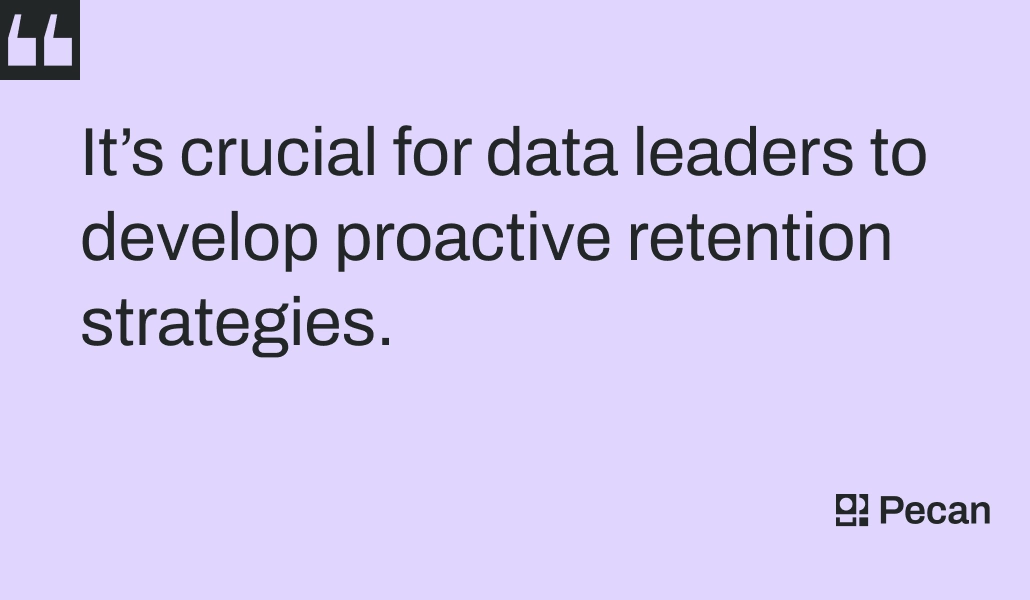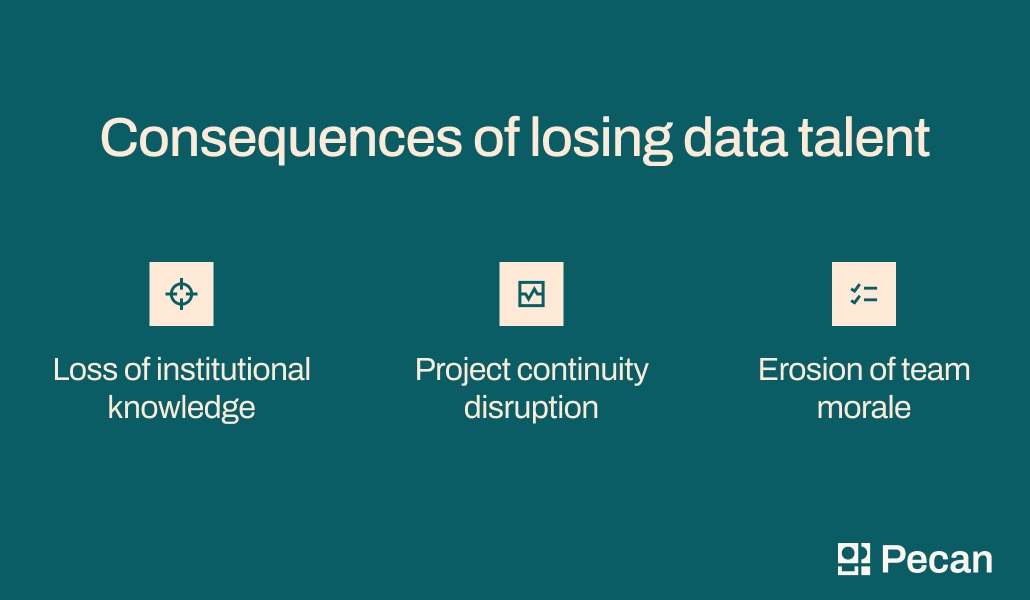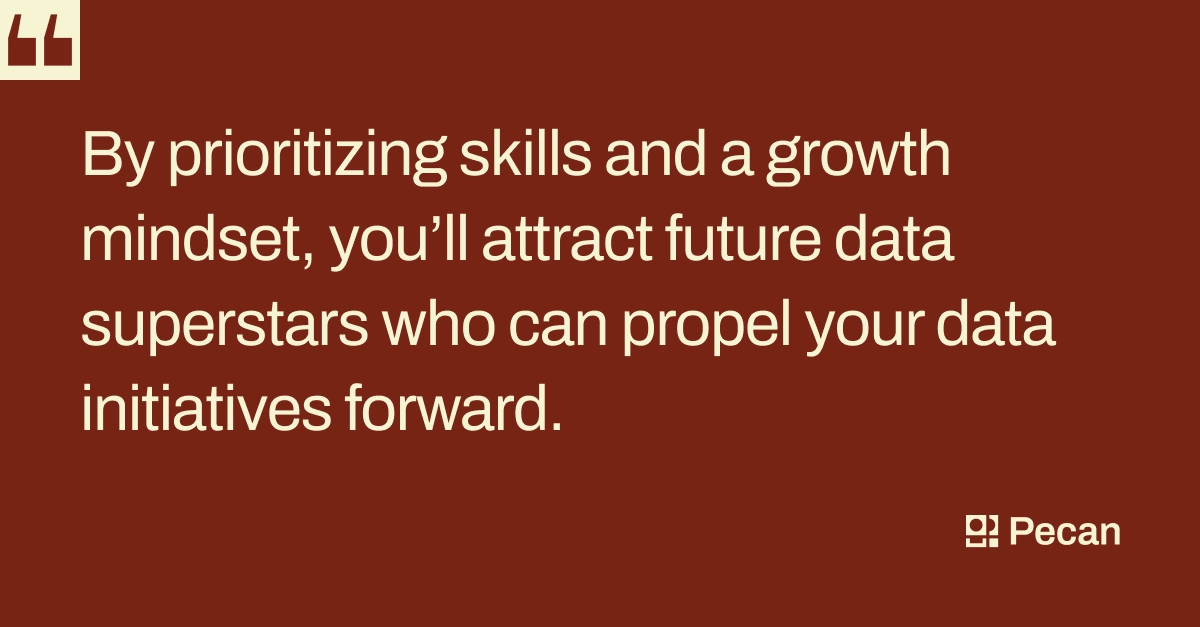In a nutshell:
- Data is the oil of the 21st century, but without skilled data workers, it's useless.
- Retaining top data talent is crucial for success in today's competitive landscape.
- Strategies include focusing on skills, continuous learning, AI upskilling, clear career paths, recognition, work-life balance, empowerment, and investing in tools.
- Data professionals are in high demand, making retention challenging.
- By investing in your data team, you can unlock the full potential of your data and drive organizational success.
Data really does rule the world — but without the ability to understand and use it, it’s nothing more than a locked treasure chest. As Peter Sondergaard, former VP of research at Gartner, famously stated, “Information is the oil of the 21st century, and analytics is the combustion engine.”
Just like raw oil, data needs to be refined and analyzed. Data scientists and analysts are the master synthesizers. They bridge the gap between raw data and actionable insights, wielding a unique combination of business savvy and analytical expertise.
However, retaining these top performers is a major challenge in today’s highly competitive job market. A 2023 Deloitte study revealed that despite ongoing tech industry layoffs, nearly 90% of tech leaders still consider talent recruitment and retention a top workforce concern. The fierce competition for skilled data professionals isn’t just a headache for data leaders and tech companies — it extends to all businesses relying on data-driven insights (hint: everyone).
-

- Get ahead of the retention challenge with proactive strategies
If even experienced recruiters are struggling to find the right talent, it’s all the more crucial for data leaders like you to develop proactive retention strategies.
This article is written for you — the data leader who understands the critical role your team plays in achieving organizational goals and the need to hold on to key team members. We’ll get into the importance of retaining your top data talent and the challenges blocking that goal. Most importantly, this article will equip you with concrete strategies to build a positive and engaging work environment that keeps your top performers happy and thriving.
Why retaining top data talent matters
Building a skilled data team is an investment — of time, resources, and industry knowledge.
These data workers usually surpass traditional engineers by deeply understanding your specific industry and business goals. They also outperform MBAs in their ability to translate complex findings into real-world applications.
But the modern talent landscape is brutal. According to a BCG study, AI became the hottest skill in 2022, and the demand for AI skills has only increased since. The volume of data scientist positions has tripled in just five years. Demand far outpaces supply, and the generative AI revolution, fueled by data interpretation, hinges on this talent.
Losing your top data workers isn’t just a setback — it’s a recipe for falling behind.
-

- The consequences of losing data talent
Here are some of the consequences of not having a proactive talent retention strategy:
- Loss of institutional knowledge: When data analysts leave, they take their business-specific knowledge with them. This creates gaps in understanding and stalls data-driven initiatives, including specific data collection methods crucial for accurate results.
- Project continuity disruption: Data analysis projects are complex and interconnected. Losing a team member mid-project can lead to delays, rework, and missed deadlines — all of which impact your bottom line.
- Erosion of team morale: High turnover is disruptive and demoralizing. It creates uncertainty and hinders team cohesion, which is critical for success.
Think of delivering insights to the organization like a complex puzzle. New hires may be skilled, but they need time to understand the pieces. Retaining your existing team ensures everyone can work collaboratively, leveraging their knowledge to complete the picture efficiently.
The takeaway? Don’t just build a data team — invest in keeping and improving them. Their expertise is the key to making data your organization’s superpower and achieving lasting success.
Why data superstars are hard to hold onto
For years, data scientists have started becoming something akin to celebrities in the workplace. These highly skilled individuals have their pick of opportunities, so why should they stay with your organization? Salary, benefits, and a compelling work environment are a good start, but in today’s competitive landscape, it takes more to keep your data superstars invested in your organization.
Here’s a glimpse into the challenges data leaders face:
- Limited pool of qualified candidates: The demand for skilled data professionals far outstrips the supply, making it hard to find replacements if you lose key team members.
- Lucrative counteroffers: Companies are willing to offer significant financial incentives to attract (or even poach) top data talent, making it challenging to keep up with the competition on salary alone.
- Lack of career development opportunities: Data professionals are ambitious and want to see a clear path for growth within their roles. If they feel stagnant or under-challenged, they’re more likely to look elsewhere.
The increasing adoption of GenAI and machine learning adds another layer of complexity. While these tools can augment your data team’s capabilities, they also create a fear of job displacement. Forward-thinking data leaders need to demonstrate how AI will enhance their team’s work, not replace individual workers.
Strategies for retaining hard-to-keep data talent
So, how can you create an environment that fosters loyalty and keeps your data talent engaged and satisfied? Here are eight creative strategies to consider:
Focus on skills, not just titles
The traditional approach of requiring candidates to tick every box on a checklist is losing out to a skills-first mindset. This forward-thinking strategy allows companies to tap into a wider pool of talented individuals, potentially uncovering hidden gems who, with the right technology and a desire to learn, can accomplish tasks with greater success than any “unicorn.” So, try moving away from the one-size-fits-all job descriptions and focus on the collective skills and experiences you need to achieve your goals.
Then, look beyond current qualifications and seek candidates with a “learner’s mindset.” Technical skills can be learned, but the ability to continuously adapt and acquire new knowledge is a true differentiator, especially with experts predicting that half of all skills will be obsolete two years from now. Hiring someone who thrives on learning ensures they’ll grow alongside your evolving business needs.
Imagine hiring a data scientist who perfectly matches your checklist today, but they’re unwilling or unable to learn and adapt to changing business priorities. They would quickly become outdated. By prioritizing skills and a growth mindset, you’ll attract future data superstars who can propel your data initiatives forward.
-

- Growth opportunities motivate high achievers.
Invest in continuous learning
Don’t pretend your organization has reached the pinnacle of data exploration. The world of data science is a constant learning curve. To stay ahead of the curve and maintain a competitive edge, fostering a culture of continuous learning within your data team is crucial.
In practice, this can look like a few different things. Sponsoring your team’s participation in conferences, workshops, and online courses allows them to acquire new skills, stay updated on industry trends, and network with other data professionals. You can also consider offering training opportunities in emerging fields like generative AI and predictive modeling. Equipping your team with these in-demand skills positions them to tackle complex challenges and unlock the true power of your data.
By investing in continuous learning, you’re not just developing your team’s skill sets. You’re investing in the future of your organization.
Embrace AI upskilling
Data professionals face a double threat: a surge in data volume and the constant pressure to extract deeper insights. The ability to work with AI tools is rapidly becoming the differentiator for success. But worry not; data science and analytics jobs aren’t going anywhere. In fact, the World Economic Forum highlights analytical thinking as the top priority for skills training.
93% of CEOs who introduce upskilling programs see increased productivity, an improvement in talent acquisition and retention, and a more resilient workforce.
— “Navigating the rising tide of uncertainty,” PwC
Predictive AI platforms like Pecan can be a data team’s secret weapon. They automate repetitive tasks, generate models in seconds, and even write SQL. Plus, with a free trial, anyone can start experimenting with various AI models. By encouraging teams to learn and experiment with AI tools, you can empower them to accomplish more with less.
Offer a clear career path
Clear career progression isn’t a perk anymore. It’s table stakes for attracting and retaining top data talent, especially in a competitive job market with high turnover. Don’t risk data pros questioning their future at your company, particularly during turbulent economies.
How do you help your data team members see a future for themselves within your organization? Initiate regular discussions about your team members’ career goals and aspirations. Then, work collaboratively to develop individualized plans that map the skills and experience needed to achieve their goals within your organization.
Promote a culture of recognition and appreciation
Beyond promotions (and a competitive salary), a fulfilling career path hinges on feeling valued and appreciated. Recognition goes a long way in building a positive work environment.
There are a few ways to show your data team you (and the organization) care. Publicly acknowledge their accomplishments, both big and small. This could be through company-wide announcements, team meetings, or even shoutout posts on social media. Then, empower growth by offering opportunities to take on leadership roles in projects or mentorship programs.
Finally, don’t forget to provide consistent and constructive feedback on their performance. This helps them understand their strengths, identify areas for improvement, and feel invested in their development.
Create a work-life balance
Data analysis thrives on sharp minds, so prioritize your team’s well-being to ensure they operate at peak potential. Here’s the key: achieving a healthy work-life balance, not complete detachment. Aim for enough personal time to recharge and pursue passions that fuel their engagement but not so much that they feel disengaged from work.
Achieving this balance could mean offering remote work options and flexible schedules, empowering individuals to manage their time effectively. It could also take the form of a generous vacation policy to encourage breaks and avoid burnout.
Most importantly, establish clear communication around acceptable off-work hours while maintaining a spirit of collaboration when work demands arise. This balance between personal time and professional fulfillment will keep your data team energized and performing at their best.
Empower your data team
Micromanagement is essentially creativity’s kryptonite. Delegate ownership and empower your analysts and scientists to make decisions and execute projects independently — and as a team. This demonstrates your confidence in their abilities and allows them to flourish.
But don’t just empower them to solve problems on their own. Create space for collaborative problem-solving. Data projects often leverage diverse skill sets, and cross-functional collaboration fosters innovation and better results. This teamwork also builds camaraderie and a shared sense of purpose.
Finally, find a way to make data analysis incredibly rewarding. You can do this by injecting a bit of fun into the workday. Think hackathons, external data analysis competitions, or even casual team lunches to create a more enjoyable work environment. It’s another way to create a sense of belonging at work, which has a profound impact on talent retention.
Invest in the right tools and technologies
Success hinges on having the right tools in your toolkit. Provide your data team with access to powerful data analytics platforms, robust cloud computing resources, and the latest visualization software. This investment demonstrates your commitment to their success and empowers them to unlock your data's full potential.
Start investing in your data talent today
By fostering a culture of autonomy and with the right tools, technologies, and a learning mindset, you’ll create an environment where data thrives and fuels organizational success. By prioritizing the well-being and professional growth of your data team, you’ll not only retain top talent but also discover new ways to uncover insights and propel your business forward.
Here are a few resources to get you started:
- Start a conversation about AI upskilling: To help you get started, we’ve compiled a list of the top AI and machine learning platforms so you can see how AI can augment your data team’s capabilities.
- Invest in growth: Implement the strategies outlined in this blog to cultivate a people-first data culture within your organization. We’d love to hear your feedback — feel free to drop us a line!
- Experience the power yourself: Many AI and machine learning platforms offer free trials, including our predictive analytics platform with GenAI capabilities. Experiment with models and discover the hidden insights waiting to be unlocked in your data.



